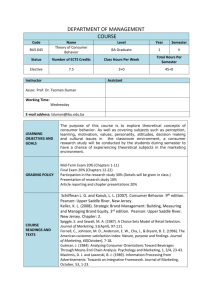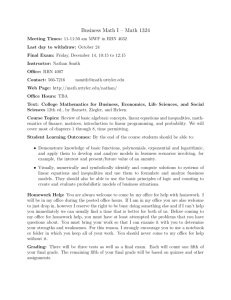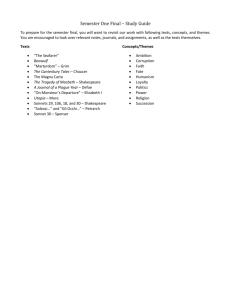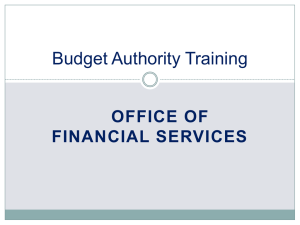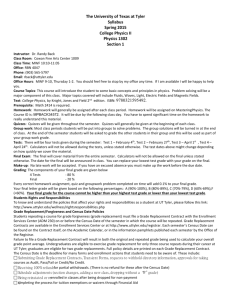HNRS 1351.001—Fall 2014 World, Text, and Image I: The Hero and
advertisement
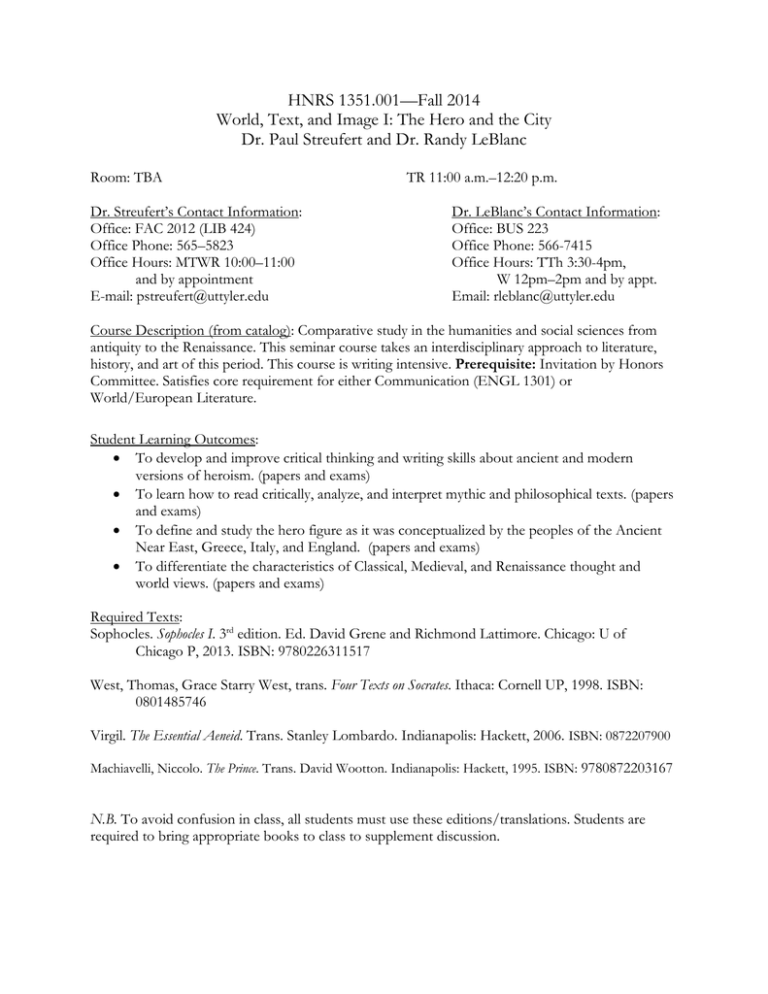
HNRS 1351.001—Fall 2014 World, Text, and Image I: The Hero and the City Dr. Paul Streufert and Dr. Randy LeBlanc Room: TBA Dr. Streufert’s Contact Information: Office: FAC 2012 (LIB 424) Office Phone: 565–5823 Office Hours: MTWR 10:00–11:00 and by appointment E-mail: pstreufert@uttyler.edu TR 11:00 a.m.–12:20 p.m. Dr. LeBlanc’s Contact Information: Office: BUS 223 Office Phone: 566-7415 Office Hours: TTh 3:30-4pm, W 12pm–2pm and by appt. Email: rleblanc@uttyler.edu Course Description (from catalog): Comparative study in the humanities and social sciences from antiquity to the Renaissance. This seminar course takes an interdisciplinary approach to literature, history, and art of this period. This course is writing intensive. Prerequisite: Invitation by Honors Committee. Satisfies core requirement for either Communication (ENGL 1301) or World/European Literature. Student Learning Outcomes: To develop and improve critical thinking and writing skills about ancient and modern versions of heroism. (papers and exams) To learn how to read critically, analyze, and interpret mythic and philosophical texts. (papers and exams) To define and study the hero figure as it was conceptualized by the peoples of the Ancient Near East, Greece, Italy, and England. (papers and exams) To differentiate the characteristics of Classical, Medieval, and Renaissance thought and world views. (papers and exams) Required Texts: Sophocles. Sophocles I. 3rd edition. Ed. David Grene and Richmond Lattimore. Chicago: U of Chicago P, 2013. ISBN: 9780226311517 West, Thomas, Grace Starry West, trans. Four Texts on Socrates. Ithaca: Cornell UP, 1998. ISBN: 0801485746 Virgil. The Essential Aeneid. Trans. Stanley Lombardo. Indianapolis: Hackett, 2006. ISBN: 0872207900 Machiavelli, Niccolo. The Prince. Trans. David Wootton. Indianapolis: Hackett, 1995. ISBN: 9780872203167 N.B. To avoid confusion in class, all students must use these editions/translations. Students are required to bring appropriate books to class to supplement discussion. 2 Grade Breakdown: Analytical papers (3 x 10% each) Mid-term exam Final Exam Attendance Participation and daily papers 30% 25% 30% 5% 10% Analytical Papers: Three times during the course of the semester, students will turn in a two-page, single-spaced, handwritten essay paper. In these papers, the student will be asked to discuss some aspect of the readings. These papers must have and support a thesis. All writing assignments will be evaluated according to the following rubric: Criterion Content and Development ____/50 points Organization and Structure ____/20 points Format ____/10 points Grammar, Spelling, and Punctuation ____/20 points Good (90-100%) Content is comprehensive, addresses itself to the issues raised by the prompt and the major points are clearly stated and well supported. Fair (75-90%) Content is not comprehensive or persuasive. Major points are identified but not well addressed. Content is inconsistent with regard to purpose and clarity of thought. The structure of the paper is clear. The Introduction/Thesis paragraph demonstrates sufficient understanding of the issues and previews major points. Paragraph transitions are present, logical, and maintain the flow of thought throughout the paper. The conclusion is logical and flows from the body of the paper. Paper follows these guidelines and is of the appropriate length. Rules of grammar, usage, and punctuation are followed. Spelling is correct. Language is clear and precise. Sentences display consistently strong, varied structure. Structure of the paper is not easy to follow. The Introduction/Thesis is missing or, if provided, does not demonstrate an understanding of the issues or preview major points. Paragraph transitions need improvement. The conclusion is missing or, if provided, does not flow from the body of the paper. You should not use crutch phrases like “In conclusion…” Paper follows most guidelines or is too long or too short. Paper contains few grammatical, punctuation, and spelling errors. Language lacks clarity or includes the use of some jargon or conversational tone. Poor (<75%) Content is incomplete. Paper demonstrates little or no understanding of the issues raised by the prompt. The content is confused or confusing and without apparent purpose. Poor or missing organization and structure detract from the writer’s discussion. The Introduction/Thesis is missing. Paragraphs are disjointed and lack transition of thought—or they are merely missing. Paper lacks many elements of proper formatting. Writer does not follow directions. Paper contains numerous grammatical, punctuation, and spelling errors. Language uses jargon or is too conversational in tone. Mid-term Exam: The mid-term will be worth 25% of the final grade. This exam will focus on readings, lectures, and in-class discussions covered in the first half of the class. The mid-term will include a significant writing component. 3 Final Exam: The final exam is scheduled for Tuesday, December 10th from 11:00 a.m. to 1:00 p.m. Following University regulations, all students must take the exam at this time. The final exam will be comprehensive and will be worth 30% of the student’s final grade. The final exam will include a significant writing component. Attendance: Attendance in this class is not only mandatory but also very important. Your contributions will be invaluable and you need to be here every day. You will be allowed two unquestioned absences. After the second absence, each additional absence will result in a full lettergrade reduction (10%) of your attendance grade. Obviously, this is a serious matter, so try to plan ahead. Unquestioned absences include sickness, job interviews, personal matters, etc. Therefore, if you anticipate having to miss class at any point during the semester, please plan accordingly. If a University activity will cause you to miss more than two classes please see your instructors. Students who anticipate being absent from class due to a religious observance are requested to inform us by the second class meeting of such absences. Participation and Daily Papers: Reading assignments are clearly listed below. All students are expected to have read the assigned material by the beginning of class. Partial completion of an assignment is unacceptable; coming to class unprepared will result in a full letter-grade reduction (10%) of your participation grade. On the other hand, please understand that while we expect you to have read the assigned readings, we do not necessarily expect you to have mastered them. Like all readers, you will have questions and perhaps even occasional problems with these texts. That’s part of the reading process. In such cases, please be sure to bring those problems and questions to class so that we can discuss them as a group. We strongly suggest that you take notes on each text while you read it, focusing on its central ideas, characters, and plot points. Such careful reading will prepare you for discussion, a vital part of this class. Also, be sure to plan ahead. Because of scheduling constraints, reading assignments are not always evenly divided. The daily writing assignment: starting on Tuesday, September 3, students will bring to class a short (3-4 sentence) paragraph describing and summarizing the substance of what we discussed in class the period before. These paragraphs may be written using notes and/or texts. The papers will be collected occasionally through the semester, and will be graded on a pass/fail basis. Failure to turn in a daily paper or to turn in a paper of low quality will result in a full letter-grade reduction (10%) of your participation grade. A note on lateness: Attendance will be taken at the beginning of the hour. If you come in late, it is your responsibility to make sure that your name has been recorded on the role. Repeated lateness indicates a lack of respect for your colleagues and professors; to avoid showing such disrespect, please be on time or you may be denied entry. A note on academic honesty: Any sort of unauthorized aid such as copying or loaning homework assignments, talking or the use of notes during tests or quizzes, will not be tolerated. Plagiarism, the unacknowledged use of another person’s language or ideas, will not be tolerated. If you cheat on anything in this class you will receive an “F” for the course. If you are unsure of what constitutes cheating in this class, please ask. Ignorance of the rules will not be tolerated as an excuse for cheating. A note on the University Writing Center: Located in BUS 202, the UT-Tyler Writing Center provides professional writing tutoring for all students in all disciplines. If you wish to use the 4 Writing Center, you should plan for a minimum of two hour-long tutorials per assignment: the first to provide an initial consultation and drafting plan, and the second to follow up. Be prepared to take an active role in your learning—you will be expected write and/or discuss your work during your tutorial. While Writing Center tutors are happy to provide constructive criticism and teach effective writing techniques, under no circumstances will they fix your paper for you. Appointments: 565-5995. For more information: www.uttyler.edu/writingcenter. A note on disturbances in class: Please turn off your cell phones before class begins. Students who send text messages during class will be asked to leave. Use of laptops or other computers (i.e. ipads) is not permitted. Students who wish to use e-books for course texts must check with instructors beforehand. A note on student absence due to religious observance or athletics. Any student who will miss any class days during the semester because of religious observance or participation in University athletics, must inform the instructors of this course no later than the second day of class. N.B. Please read carefully the final sheet of this syllabus which contains university-wide policies on disability services, emergency procedures, etc. 5 Schedule/Assignment List: (Note: This schedule is tentative and subject to revision) Week 1: (8/26–28) T: Course introduction, syllabus, introduction to Mesopotamia R: The Epic of Gilgamesh (handout—available on Blackboard) Week 2: (9/2-4) T: The Epic of Gilgamesh cont. R: The Epic of Gilgamesh cont. Week 3: (9/9–11) T: Sophocles Oedipus the King; introduction to Greece R: Oedipus the King cont. Week 4: (9/16–18) T: Oedipus the King cont. (Paper 1 due) R: Sophocles Oedipus at Colonus Week 5: (9/23–25) T: Oedipus at Colonus cont. R: Sophocles Antigone Week 6: (9/30–10/2) T: Antigone continued R: Review Week 7: (10/7–9) T: Mid-term exam R: Introduction to Greek Philosophy Week 8: (10/14–16) T: Life and Death in the Cave (Plato, from Republic, Book VII—handout) R: Plato Apology Week 9: (10/21–23) T: Apology cont. R: Plato Crito 6 Week 10: (10/28–30) T: Virgil Essential Aeneid Book 1; (Paper 2 due) R: Essential Aeneid Books 2–4 Week 11: (11/4–6) T: Essential Aeneid Books 6–8 R: LIBRARY DAY Week 12: (11/11–13) T: Essential Aeneid Books 9–12 R: Kohl, The Earthly Republic, pp. 3-8; 25-32 Week 13: (11/18–20) T: Kohl, The Earthly Republic, pp. 35-58 R: Kohl, The Earthly Republic, pp. 58-78; 121-134; (Paper 3 due) Week 14: (11/25–27) T: No Class—Thanksgiving Day Break R: No Class—Thanksgiving Day Break Week 15: (12/2–4) T: Kohl, The Earthly Republic, pp. 135-175 R: Review for final exam Week 16: (12/9) Tuesday, Dec. 10th, 11:00 am–1:00 pm FINAL EXAM 7 Students Rights and Responsibilities To know and understand the policies that affect your rights and responsibilities as a student at UT Tyler, please follow this link: http://www2.uttyler.edu/wellness/rightsresponsibilities.php Grade Replacement/Forgiveness and Census Date Policies Students repeating a course for grade forgiveness (grade replacement) must file a Grade Replacement Contract with the Enrollment Services Center (ADM 230) on or before the Census Date of the semester in which the course will be repeated. Grade Replacement Contracts are available in the Enrollment Services Center or at http://www.uttyler.edu/registrar. Each semester’s Census Date can be found on the Contract itself, on the Academic Calendar, or in the information pamphlets published each semester by the Office of the Registrar. Failure to file a Grade Replacement Contract will result in both the original and repeated grade being used to calculate your overall grade point average. Undergraduates are eligible to exercise grade replacement for only three course repeats during their career at UT Tyler; graduates are eligible for two grade replacements. Full policy details are printed on each Grade Replacement Contract. The Census Date is the deadline for many forms and enrollment actions that students need to be aware of. These include: for taking courses as Audit, Pass/Fail or Credit/No Credit. o refund for these after the Census Date) -enrolled in classes after being dropped for non-payment emptions or waivers through Financial Aid State-Mandated Course Drop Policy Texas law prohibits a student who began college for the first time in Fall 2007 or thereafter from dropping more than six courses during their entire undergraduate career. This includes courses dropped at another 2-year or 4-year Texas public college or university. For purposes of this rule, a dropped course is any course that is dropped after the census date (See Academic Calendar for the specific date). Exceptions to the 6-drop rule may be found in the catalog. Petitions for exemptions must be submitted to the Enrollment Services Center and must be accompanied by documentation of the extenuating circumstance. Please contact the Enrollment Services Center if you have any questions. Disability Services In accordance with Section 504 of the Rehabilitation Act, Americans with Disabilities Act (ADA) and the ADA Amendments Act (ADAAA) the University offers accommodations to students with learning, physical and/or psychiatric disabilities. If you have a disability, including non-visible disabilities such as chronic diseases, learning disabilities, head injury, PTSD or ADHD, or you have a history of modifications or accommodations in a previous educational environment you are encouraged to contact the Student Accessibility and Resources office and schedule an interview with the Accessibility Case Manager/ADA Coordinator, Cynthia Lowery Staples. If you are unsure if the above criteria applies to you, but have questions or concerns please contact the SAR office. For more information or to set up an appointment please visit the SAR office located in the University Center, Room 3150 or call 903.566.7079. You may also send an email to cstaples@uttyler.edu Student Absence due to Religious Observance Students who anticipate being absent from class due to a religious observance are requested to inform the instructor of such absences by the second class meeting of the semester. Student Absence for University-Sponsored Events and Activities If you intend to be absent for a university-sponsored event or activity, you (or the event sponsor) must notify the instructor at least two weeks prior to the date of the planned absence. At that time the instructor will set a date and time when make-up assignments will be completed. Social Security and FERPA Statement: It is the policy of The University of Texas at Tyler to protect the confidential nature of social security numbers. The University has changed its computer programming so that all students have an identification number. The electronic transmission of grades (e.g., via e-mail) risks violation of the Family Educational Rights and Privacy Act; grades will not be transmitted electronically. Emergency Exits and Evacuation: Everyone is required to exit the building when a fire alarm goes off. Follow your instructor’s directions regarding the appropriate exit. If you require assistance during an evacuation, inform your instructor in the first week of class. Do not re-enter the building unless given permission by University Police, Fire department, or Fire Prevention Services.


